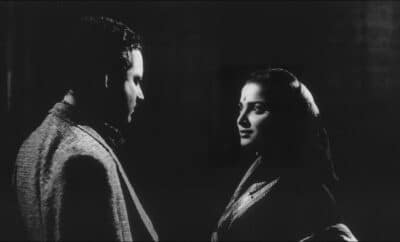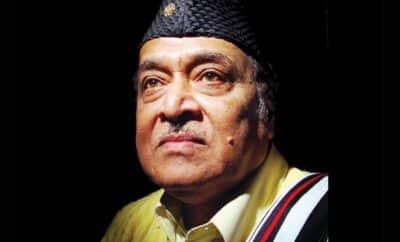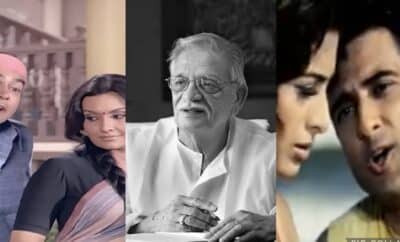Collections
Gulzar’s Description of Time – The Fifth Dimension
As they say, whatever is meant for you will come to you. There was a young Sikh chap in Jhelum district in British India (now in Pakistan), who had to stop his studies and move to Mumbai (then Bombay) after the partition to support his family. He started taking up small jobs to eke out a living, including one at a garage. As he had a flair for writing and poetry, he would participate in Sunday meetings of the Progressive Writers’ Association (PWA), where he got a chance to interact with the stalwarts of Hindi cinema like Shailendra and Bimal Roy. However, the young chap was not inclined towards entering Hindi cinema.
It was during this period that Bimal Roy’s masterpiece Bandini (1963) was in making. S.D. Burman, who was composing the soundtrack ended up into a feud with the lyricist Shailendra, who decided to leave the assignment. Shailendra was, however, kind enough not to leave the filmmaker in a kettle of fish. Having had a glimpse of the young chap’s acumen, he persuaded the young chap to write lyrics for the film. The young chap, who had no intention to work for films, agreed to take up the work hesitantly and wrote his first ever film song, “Mora gora ang lai le”. The song, though written with a folksy, agrestic flavour, had a unique metaphor and announced the arrival of a great lyricist on the landscape of Hindi cinema, who would go on to become also a renowned poet, author, screenwriter and director.
Yes, you are right! The young chap was Sampooran Singh Kalra aka Gulzar! Don’t they say, whatever is meant for you will come to you? Hindi cinema was meant for Gulzar, and he ended up being there. What’s more, the magician of words was meant for us film music afficionados, and he kept on coming to us through his immortal songs to colour our lives with various unmatchable shades of love, romance, joys, sorrows, and philosophy.
After getting his first break in Bandini, Gulzar never looked back. Starting with relatively simple imagery, the poetry in his lyrics evolved to encompass unusual and unique metaphorical word pictures as a peculiar trait. The appealing factor in his lyrics is that most of us are able to relate to them. The feelings expressed therein seem our own feelings that have been buried deep inside since eternity. He has an unparalleled ability to translate our incorporeal and complex feelings into words. Of course, his somewhat abstract poetry is not easy to understand. But once we understand it, it often acts as a revelation, touches our inner core, and leaves us with goosebumps.
Besides highlighting realities and philosophies of life in a nonesuch way, Gulzar’s songs also talk in a distinct way about time and its supremacy, sometimes subtly and sometimes clearly. Let us have a quick ride through his songs speaking about different aspects of time.
There can’t be a better song than “Aane waala pal jaane waala hai” (Gol Maal – 1979) to start the ride. In this song, Gulzar highlights the evanescent nature of time, which never stops for anyone. Gulzar says, “Dekha to yahin hai, dhoondha to nahin hai, pal jo ye jaane waala hai” (the passing moment was just here when I saw it, and now it’s nowhere!). He therefore asks us to live every moment of life to the fullest.
https://www.youtube.com/watch?v=N2gynVw5Gy0
In the same song, Gulzar further says –
Ek baar waqt se lamha gira kahin,
Wahaan daastaan mili, lamha kahin nahi,
Thoda sa hansa ke, thoda sa rula ke, pal ye bhi jaane wala hai
In another song written much later by him, “Ye lamha filhaal jee lene de” (Filhaal – 2002), he again highlights the importance of living in the moment. He beautifully describes the uncertainties in life and says that these uncertainties only make life exciting and worth living, albeit with a soupcon of fear.
Evening is that span of time which often has a deep impact on human minds, particularly in the world of lovers. Come evening, those who are in love start either missing their lovers or enjoying their company with more intimacy, while the grief of the lovelorn becomes deeper and darker. Gulzar has stupendously captured these shades of evening in many of his songs. For example, in “Wo shaam kuchh ajeeb thi” (Khamoshi – 1969), he has portrayed an awkwardly romantic evening, wherein the heroine, although in love with the hero, hesitates from reciprocating the feelings that he is pouring out to her.
He has described the darker side of the evening in a touching way in quite a few soulful songs. In the song “Surmai shaam is tarah aaye” (Lekin – 1991), he thus describes the arrival of evening – “Surmai shaam is tarah aaye, saans lete hain jis tarah saayen”. The kohl-ish evening arrives, as though the evening shadows are breathing. What a spectacular imagination! He further says, “Waqt jaata sunaayi deta hai, tera saaya dikhaayi deta hai”. He hears the footsteps of time passing by and sees the shadow of his lover – unimaginable way of expressing that he feels his lover around every moment.
https://www.youtube.com/watch?v=VfaqM5wfCY0&t=75s
Another brilliant song by Gulzar on evening and time is “Shaam se aankh mein nami si hai, aaj phir aapki kami si hai” (from the private album Marasim by Jagjit Singh and Gulzar). The song expresses the pain of missing the loved one, in a moving way. Gulzar again highlights the fugacious nature of time comparing it with fickle human beings –
Waqt rehta nahin kahin tik kar,
Iski aadat bhi aadmi si hai
In “Bhej kahaar piya ji bula lo” (Maachis – 1996) he describes a desolate evening as “Saanjh dhale sooni gali darwaaze tak aye, koi nahin aaya abhi itni khabar de jaaye”. Does this not instantly make you visualise a lonely house situated towards the fag end of a deserted lane, with a woman waiting for her love with perseverance? In another song from the same film (Yaad na aaye koi), while describing the dark night capturing the world in no time after the evening, Gulzar says – “Shaam ke diye ne aankh bhi na kholi, andhaa kar gayi raat” (the evening lamp was just lit, and the night has soon rendered it useless with its darkness).
In “Khaali haath shaam aayi hai” (Ijaazat – 1987), he intensely brings to life the pathos of a wife who believes that her husband is being unfaithful to her and finds her life empty, devoid of soul. The refrain itself pulls on our heartstrings –
Khaali haath shaam aayi hai, Khaali haath jaayegi,
Aaj bhi na aaya koi, khaali laut jaayegi
After an empty evening, the pitch-dark night takes over; and her anguish darkens further. She begs her husband to come back and help her get rid of the darkness of the night; else the darkness will come back to fill the void in her life tomorrow again.
Raat ki siyaahi koi aaye to mitaaye na,
Aaj na mitaayi to ye kal bhi laut aayegi
Just like evening, night also brings along an altogether different world. Both, those in love as well as those who are bereft of love spend sleepless nights for own sets of reasons. Gulzar powerfully sketches the pictures of these different shades of night too. For instance, in “Beeti na bitaayi raina” (Parichay – 1972), he effectively depicts a distressful night of separation –
Beeti na bitaayi raina, biraha ki jaayi raina,
Bheegi huyi akhiyon ne laakh bujhaayi raina…
The night of separation seems unending. The tearful eyes have been trying to extinguish the burning night without any avail.
Further, while describing the relativity of time, Gulzar says –
Yug aate hain, aur yug jaayen,
Chhoti chhoti yaadon ke pal nahin jaayen
The eras pass by more quickly than these tiny moments of memories!
He has described the unending nights in several other songs, for example – “Khwab chun rahi hai raat, beqaraar hai” (Tum pukaar lo) (Khamoshi – 1969); “Jaane kya soch kar nahin guzra, ek pal raat bhar nahin guzra” (Kinaara – 1976); “Din khaali khaali bartan hai, aur raat hai jaise andha kuaan” (Ek akela is sheher mein) (Gharonda – 1977) and “Yaara seeli seeli biraha ki raat ka jalna” (Lekin – 1991).
https://www.youtube.com/watch?v=0grTfrgrEnY
In “Phir wohi raat hai, phir wohi raat hai khwab ki” (Ghar – 1978), he paints a beautiful portrait of a night brimming with love and romance.
https://www.youtube.com/watch?v=Gi__cm8RAJA
For some, evenings and nights after a busy day are prolonged, whereas for a few others, the entire life itself seems like a prolonged, unending journey. Gulzar poignantly narrates the anguish of one such poor soul locked in a time warp through another song from Lekin (1991) –
Main ek said se baithi hoon, is raah se koi guzra nahin,
Kuchh chaand ke rath to guzre the, par chaand se koi utraa nahin…
Now look at the counterpoint in his soul stirring song “Samay o, dheere chalo” from Rudaali (1993), in which he narrates the endless journey of an overburdened life, wherein it is difficult to cope up with the speed of rapidly fleeting time.
In our hectic lives, we keep on getting busier day by day and tend to relive the bygone peaceful days through their fond memories. These memories make us forget our stress momentarily, with a pinch of regret of not being able to hold the slipping sand of time in our fists. Gulzar’s timeless song about such bypast times “Dil dhoondhta hai phir wohi fursat ke raat din” (Mausam – 1975) exactly captures this pleasure of reliving the memories with an outline of remorse. Through this song, Gulzar has paid tribute to the eminent poet Mirza Ghalib by using his lines as the refrain of the song.
Discussion on Gulzar’s songs about time would never be complete without the mention of the iconic song “Naam gum jaayega, chehra ye badal jaayega, meri aawaaz hi pehchaan hai, gar yaad rahe” (Kinaara – 1976). In this song, he once again brings on the supremacy of time –
Waqt ke sitam kam haseen nahin,
Aaj hain yahaan, kal kahin nahin,
Waqt ke pare agar mil gaye kahin,
Meri aawaz hi pehchaan hai, gar yaad rahe
Time is pretty unpredictable. While we are together here today, we might be nowhere tomorrow. If we ever meet beyond the time, you may recognise me by my inner voice, by the voice of my soul. Therefore, please listen to the voice of my soul today and remember it forever.
If time is the fourth dimension, Gulzar’s words have always added one more dimension to the description of time. Hope you enjoyed the quick ride through this fifth dimension.




Preeti Paliwal
August 18, 2021 at 6:14 pm
In love with the evenings …credit Gulzhar Saab
Virender
August 18, 2024 at 8:49 am
Excellent read … very well written Yogesh 👏🏼👏🏼👏🏼
Madhupati Sharma
August 18, 2024 at 6:11 pm
A well researched article.
Rahgeer song came to mind telling taste of time
….
Raat kahi namkin mile to
Mithe sanjh savere…
https://youtu.be/ZX0thA4Gk28?si=WAMGU9xIqUSVr-ZD